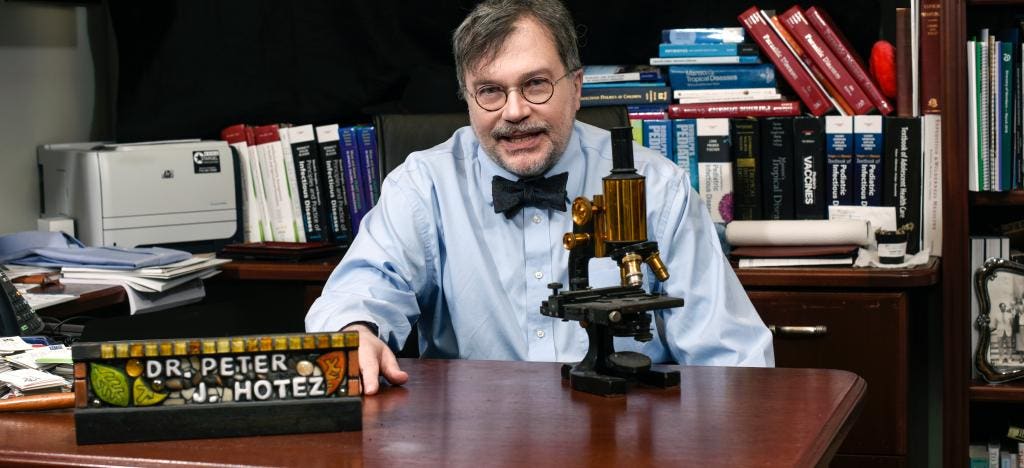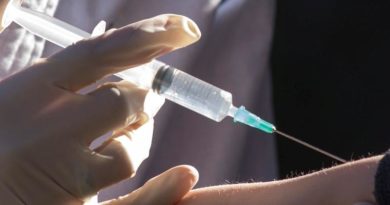Musk Incites Anti-Vaccine Conspiracists By Mischaracterizing Peter Hotez

“Maybe @PeterHotez just hates charity,” Elon Musk tweeted the other day. Musk was referencing the fact that Peter Hotez refused an offer of $100,000, which he could then donate to a charity of his choice, to debate Robert Kennedy Jr. on Joe Rogan’s podcast.
Hotez did agree to go on Rogan’s show to explain his position on vaccines, but not to debate Kennedy directly. For years, Hotez has been under assault by the anti-vaccine community, and more generally by a plethora of conspiracists. Consequently, Hotez appears reluctant to give Kennedy a platform to espouse crank opinions on vaccines.
Hotez has long contended that 200,000 unvaccinated Americans needlessly died during the Covid-19 Delta and BA.1 Omicron waves in 2021 and 2022. Many, in his view, refused the vaccine because of widespread disinformation. Hotez describes this in his book The Deadly Rise of Anti-Science.
One of the more vocal figures misinforming the public has been Kennedy. He went on Rogan’s show recently to once again back Covid-19 vaccine conspiracy theories. Kennedy also reiterated the debunked notion that there’s a link between childhood vaccines and autism. Hotez took to social media to criticize the unchecked misinformation, which prompted Rogan and Musk to issue the challenge.
What’s especially strange about Musk’s tweet is that it grossly mischaracterizes Hotez. As a renowned researcher and professor of pediatrics, molecular virology and microbiology at the Baylor College of Medicine (he is also dean of the National School of Tropical Medicine), he has worked on behalf of charitable or nonprofit organizations for decades.
Raising Awareness of Neglected Tropical Diseases
Among other humanitarian pursuits, Hotez was a pioneer in the fight against neglected tropical diseases in the developing world. Twenty years ago, Hotez and colleagues coined the term. He’s referred to NTDs as “the most important diseases you’ve never heard of,” because they impact the world’s most vulnerable, impoverished populations. NTDs affect more than one in six people globally, often the very poorest, causing significant mortality and morbidity, including an estimated 35,000 deaths per day.
But, lacking commercial prospects, NTDs have largely been ignored and underfunded by the pharmaceutical industry. Historically, pharma has allocated less than 0.5 percent of global drug investment to NTDs.
For the last 20 years, Hotez has made it a mission to do what he can to help build awareness around the diseases and develop treatments. Hotez is author of Forgotten People, Forgotten Diseases: The Neglected Tropical Diseases and Their Impact on Global Health and Development. In it, he describes the heterogeneous group of infections which are highly prevalent in developing regions of Africa, Asia and the Americas. They include, among others, onchocerciasis (river blindness), African trypanosomiasis, leishmaniasis, cholera, Chagas disease and Dengue fever. These are often chronic and disabling illnesses caused by parasites, bacteria, viruses, protozoa and other pathogens.
Expanding Reach Of Covid-19 Vaccines
Hotez has also been a prominent Covid-19 vaccine developer and advocate, not only in the U.S., but also internationally. During the Covid-19 pandemic, Hotez worked with Maria Elena Bottazzi on developing a low-cost, patent-free vaccine. The overarching purpose of this nonprofit venture was to expand the reach of vaccines to the lower-income regions of the world.
The protein subunit vaccine formula is similar in structure to the hepatitis B vaccine. It can be named and licensed by a vaccine producer in any low- or middle-income nation. In turn, the local company manufactures the vaccine, and together with local authorities organizes a distribution system for vaccine delivery to clinics and hospitals around the country. In India, the vaccine is called Corbevax, and it is licensed to the Indian biopharmaceutical company Biological E. Limited. In Indonesia, the domestic firm Bio Farma is responsible for manufacturing the vaccine, which it calls IndoVac.
The noxious bullying of Hotez by Rogan and Musk on Twitter is emblematic of today’s culture in which stirring the pot attracts more eyeballs than a sober, substantive discussion. Perhaps even more troubling, however, is Musk’s demeaning tone when he tweets that Hotez is “afraid of a public debate, because he knows he’s wrong.”
Hotez is a well-respected vaccine scientist who has spent his entire career dedicated to medicine and public health. In this regard, declining a debate with an anti-vaccine crusader is understandable. It would amplify and in the eyes of many viewers legitimize Kennedy as somehow an equal adversary, which he is not.

